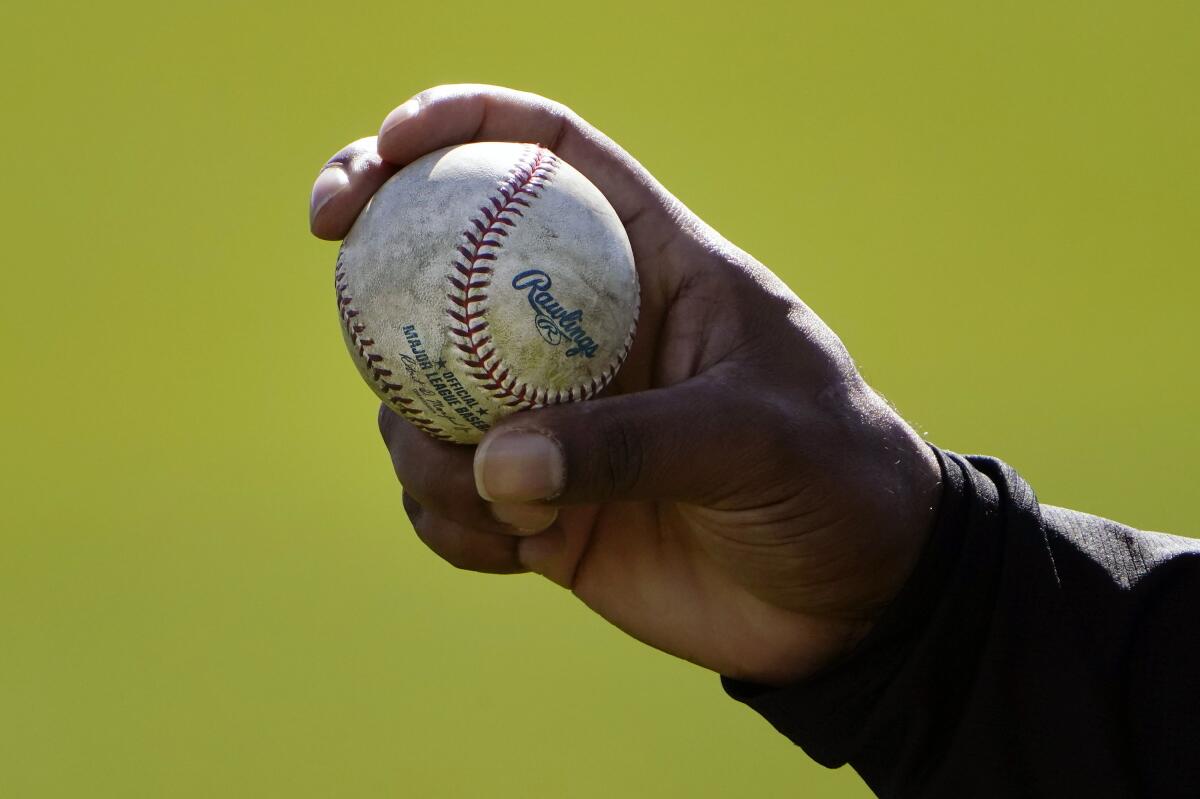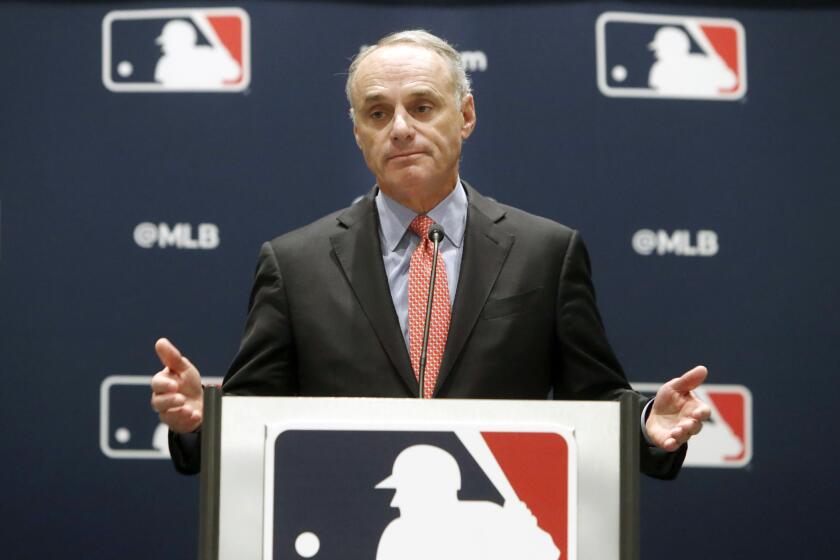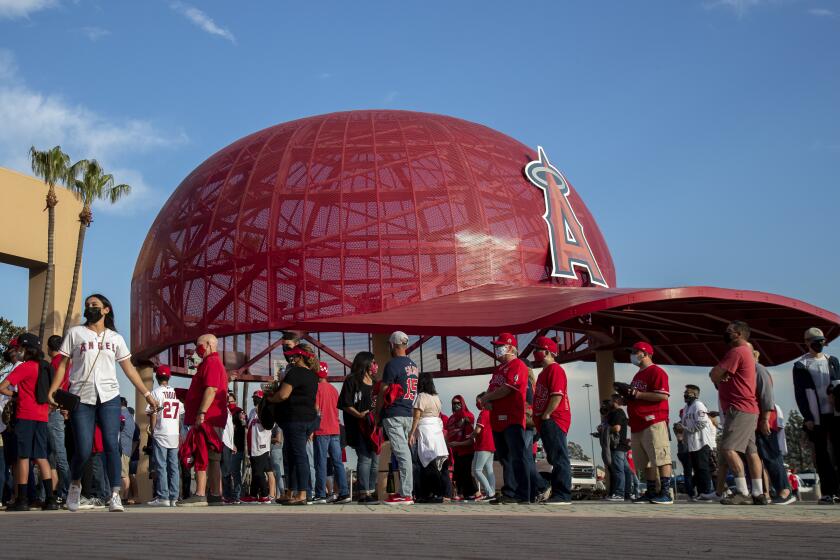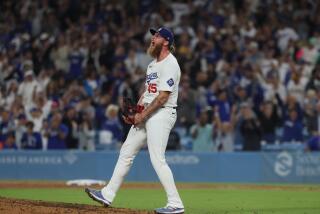Commentary: MLB pitching crackdown is crisis management

The “best interest of baseball” is a nice turn of phrase, and a romantic notion. Self-interest is the governing principle, in baseball and in life.
It’s not just pitchers, the souls targeted by the commissioner’s office in its memo Tuesday announcing that longstanding rules against doctoring the ball would now be strictly enforced.
This is Andrew Friedman, the Dodgers’ president of baseball operations, at the Sloan Sports Analytics Conference in April, talking about building a championship team: “It’s about going up to the line, and straddling it, and finding any opportunity on the margins. It’s not any different than I was as an 8-year-old kid.”
Whether players or executives, winners are paid to win, not to engage in ethical debates about how blurry the line might be. His job is to exploit loopholes. It is on the league, not on him, to close loopholes.
For pitchers, loading up the ball was taking advantage of a gaping loophole. If a pitcher can get better by straddling that line, by rubbing some goop on the ball that makes it dip and dart and spin, and if he can win and make some millions without getting caught, why not?
In 2002, four years after Mark McGwire and Sammy Sosa captivated America with what we later learned was a steroid-fueled quest to set a single-season home run record, and one year after Barry Bonds beat them both with a steroid-aided 73 home runs while then-Commissioner Bud Selig grimaced, owners and players agreed to determine how big a problem they had.
Sluggers made money, and made the owners money. “Chicks dig the long ball” was a great slogan, but not at the expense of congressional intervention.
MLB pitchers caught using illegal substances to doctor balls will be ejected and suspended 10 games in a crackdown starting Monday.
In 2003, players were tested anonymously for steroids. If 5% of players tested positive, mandatory testing would be triggered the following year, with suspensions. Self-interest ruled the day: More than 5% tested positive, with players hitting bombs and getting paid at the time, and worrying about suspensions later.
Self-interest ruled the day here too, until Tuesday.
That pitchers applied sunscreen to the ball was public knowledge eight years ago. A ball literally stuck to the chest protector of St. Louis Cardinals catcher Yadier Molina four years ago. Dodgers pitcher Trevor Bauer first spoke up about this three years ago, and he said he has spoken with Manfred and other league executives since then.
Strikeouts and spin rates got pitchers paid, and the league celebrated velocity and meme-worthy pitches.
In essence, the league tried to scare pitchers straight last year by forcing out Angels clubhouse manager Bubba Harkins, who learned his recipe for sticky goo from former Angels closer Troy Percival, who last played in Anaheim 17 years ago. Without suspensions, strikeouts and spin rates still got pitchers paid.
Harkins sued and — as The Times’ Mike DiGiovanna first reported — he named big names: Gerrit Cole, Justin Verlander, Max Scherzer, Felix Hernandez, Corey Kluber and Adam Wainwright. At the start of the season, the league said it would do this year what the anonymous steroid testing was intended to do in 2003: collect data and evidence to see whether there was a problem.
Two months was enough for the league.
“I understand there’s a history of foreign substances being used on the ball, but what we are seeing today is objectively far different, with much tackier substances being used more frequently than ever before,” Commissioner Rob Manfred said in a statement Tuesday. “It has become clear that the use of foreign substance has generally morphed from trying to get a better grip on the ball into something else — an unfair competitive advantage that is creating a lack of action and an uneven playing field.”
I asked Dodgers manager Dave Roberts whether he thought the league’s action was proactive or reactive.
“I think it’s 100% reactive,” Roberts said. “If it wasn’t reactive, it wouldn’t happen during the middle of a season.”
The league could have adopted a tackier ball, along the lines of the ones used in Asian leagues. The league could have adopted a list of approved substances for improving ball grip, just as it adopted a list of approved supplements in the aftermath of the steroid era. The league did neither, throwing out all the substances to which pitchers have gotten accustomed, and threatening to throw out the pitchers too.
Harkins, fired by the Angels amid MLB crackdown on pitch-doctoring, is looking to appeal after his defamation suit against team and MLB was dismissed.
“To tell us to do something completely different in the middle of a season is insane,” Tampa Bay Rays pitcher Tyler Glasnow said Tuesday. “There has to be some give and take here.”
The league gave one year’s notice of the three-batter minimum for relief pitchers, but one week’s notice for this. Glasnow, one of baseball’s bright young stars, said he traces his torn elbow ligament to tightening his grip on the ball in anticipation of the crackdown, to make up for the loss of the time-honored sunscreen/rosin combination.
“You can’t just tell us to do nothing,” Glasnow said. “It’s crazy.”
This gives the appearance of crisis management more than prudent management. The crisis, of course, is disappearing offense — and, as Manfred put it in his statement, “lack of action.” The minor leagues are acting as laboratories this season for all kinds of potential remedies: limits on defensive shifts, limits on pickoff throws, larger bases to minimize the distance between them and encourage stolen bases, a 15-second pitch clock, and robot umpires.
There is no crisis management without a crisis. If the league had acted on the substance issue proactively rather than reactively, perhaps the loss of offense would not have hit crisis proportions.
More to Read
Go beyond the scoreboard
Get the latest on L.A.'s teams in the daily Sports Report newsletter.
You may occasionally receive promotional content from the Los Angeles Times.













